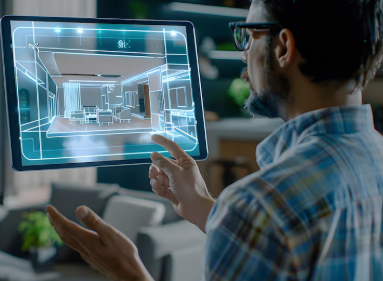In today’s rapidly evolving digital landscape, businesses need innovative solutions to remain competitive and efficient. Companies like STL Digital are empowering enterprises to achieve this by delivering cutting-edge cloud services and digital transformation strategies. One of the most significant advancements in recent years is the integration of cloud technology into industrial control systems, which is paving the way for the development and deployment of advanced digital twins.
Understanding the Shift to Cloud-Based Control Systems
Traditional control systems in industries have always been bound by physical infrastructure, proprietary software, and limited connectivity. These systems operate in isolation and often lack the agility required to keep up with today’s dynamic business needs. However, cloud technology has revolutionized this domain by introducing scalability, flexibility, and integration capabilities.
Cloud services allow control systems to move beyond the limitations of on-premise infrastructure. With cloud consulting services, organizations can design control architectures that are adaptable, secure, and remotely accessible. These services are the foundation for developing enterprise applications that manage and optimize operations more efficiently.
By adopting cloud-enabled control systems, businesses unlock a range of benefits such as real-time monitoring, predictive analytics, and remote operation. These systems also enable seamless integration with AI/ML and IoT devices, facilitating smarter and more responsive control environments
The Role of Digital Twins in Industrial Evolution
Digital twins are digital replicas of physical assets or systems that mirror real-time data, performance, and environmental conditions. These virtual models can simulate, predict, and optimize operations, offering insights that were previously difficult or impossible to obtain with traditional control systems.
The foundation of effective digital twins is robust cloud infrastructure. Cloud services play a critical role in collecting, processing, and analyzing the vast volumes of data required for digital twins to function. With reliable cloud consulting services, businesses can design the right data architecture and enterprise applications to fully harness the power of digital twins.
Digital twins also aid in proactive maintenance, reduce downtime, and improve decision-making processes. They are particularly useful in complex environments such as manufacturing plants, energy grids, and smart cities. As industries modernize, the integration of digital twins into control systems becomes not only feasible but essential for achieving operational excellence.
Industry Trends and Market Projections
The growing importance of cloud technology in business strategy is underscored by industry-leading research.
According to Gartner, global spending on public cloud services is projected to reach $679 billion in 2024 and surpass $1 trillion by 2027. Gartner notes that by 2028, cloud computing will evolve from being a disruptive technology to becoming an essential element of business competitiveness. This signals a significant shift in how enterprises perceive and adopt cloud solutions.
Gartner’s report also highlights that businesses are leveraging cloud not just for technical advantages, but as a strategic enabler for innovation and customer engagement. This aligns with the growing demand for advanced control systems that support continuous improvement, efficiency, and adaptability.
In a similar vein, Forrester predicts that the public cloud market will surpass $1 trillion by 2026. This growth will be driven by premium services such as analytics, AI/ML, and cloud-native enterprise applications. These technologies are central to the advancement of digital twins and cloud-integrated control systems.
Forrester also emphasizes the importance of database and analytics services, which are expected to grow to $89.5 billion by 2026, as organizations pursue greater operational efficiency and innovation through AI. Furthermore, development services and SaaS applications will continue to rise as companies strive to stay agile and future-ready.
Real-World Applications and Benefits
Industries across the globe are already reaping the benefits of modernized control systems powered by cloud technology. From predictive maintenance in manufacturing to real-time energy management in utilities, the applications are vast and varied.
One prominent example is in the automotive sector, where manufacturers use digital twins to simulate vehicle performance under different conditions. Cloud-based control systems enable real-time feedback, allowing engineers to tweak designs without physical testing.
In the energy sector, smart grids are using cloud-enabled control platforms to manage demand response, monitor grid stability, and forecast energy usage. These systems rely heavily on enterprise applications that interact seamlessly with cloud infrastructure and digital twins.
Logistics and supply chain operations have also embraced cloud transformation. Real-time tracking, inventory management, and route optimization are all made possible through cloud services and digital twins. These technologies help organizations respond quickly to disruptions and maintain high service levels.
Challenges and Considerations
While the benefits are clear, transitioning to cloud-based control systems does present challenges. Security, latency, and regulatory compliance are major concerns that organizations must address. This is where experienced cloud consulting services become invaluable.
STL Digital helps enterprises navigate these complexities by offering tailored solutions that align with industry standards and business goals. From selecting the right cloud model (public, private, or hybrid) to implementing secure data flows and integrating with existing systems, STL Digital ensures a smooth and successful transformation journey.
Moreover, training personnel to operate and manage cloud-native control systems is essential. Change management and skill development are crucial to unlocking the full potential of these technologies.
The Future of Control Systems is Cloud-First
The convergence of cloud computing and control systems marks a turning point in industrial automation. With the rising adoption of digital twins and intelligent enterprise applications, businesses are better equipped to innovate, adapt, and lead in their respective markets.Cloud services and digital transformation are not optional investments—they are strategic imperatives.
As organizations prepare for the next phase of digital evolution, partnering with a trusted leader like STL Digital can make all the difference. STL Digital delivers comprehensive solutions that modernize control systems, implement robust digital twins, and drive sustainable digital transformation. Now is the time to act—to reimagine control systems not as isolated tools, but as dynamic, cloud-powered engines of innovation.



